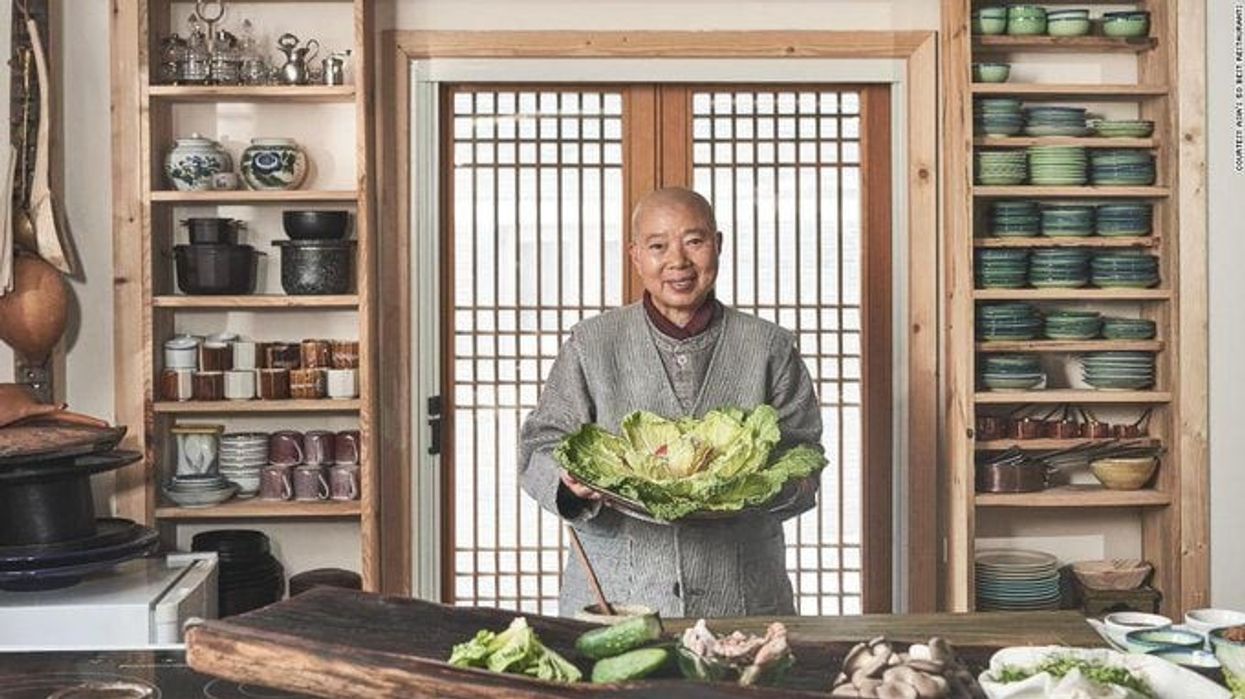Celebrated monk-chef Jeong Kwan meditatively prepares her simple and organic dishes, braising mushrooms, tearing up greens, and tossing them in an assortment of sauces before serving them with care and artistic flair, perhaps as a part of her quest for spirituality.
“... even this old activity of cooking is the pursuance of truth for me,” said Jeong, who first visited India 20 years ago as a Buddhist disciple and is a familiar face for those who have watched the Netflix show “Chef's Table”.
The international food community refers to her as the "monk-chef" for her role in promoting Korean temple food worldwide. She aims to use food as a bridge between India and South Korea, as she believes it can bring people together.
During her first visit to India, she was a disciple seeking to learn and understand the Buddha's mind and spirit. However, on her latest visit, she came to teach and communicate with the people of India through temple food, as she has discovered their interest and passion for Korean cuisine. She shared this with PTI through an interpreter.
During her recent visit to India, the 66-year-old "monk-chef" expressed her hope and expectation that food would serve as a means for greater communication and exchange between cultures.
At a presentation and lecture on Korean temple food held at the Korean Culture Centre India (KCCI), she served two simple dishes with minimal fuss to a select audience. These included braised shiitake mushrooms with grain syrup and a fresh salad with fermented tofu paste and other sauces.
Kwan's culinary creations feature a combination of fresh vegetables and preserved pastes and sauces, showcasing the importance of food preservation. As a vegan chef, she omits onions, garlic, leeks, scallions, and chives in her cooking. She believes in using food as a means to promote "peace and harmony" and respects all living organisms.
Kwan's cooking philosophy involves a creative process that transforms emptiness into something new and meaningful, as even a single ingredient can embody the universe and principles of nature.
She does not have a restaurant and no fixed recipes. Despite this, she was honoured with Asia's 50 Best Restaurants Icon Award last year. Kwan is based in Baekyangsa temple near Seoul.
Utilising the day's fresh produce and Korean fermented sauces and pastes, some of which are several decades old, is a hallmark of Kwan's cooking style. She considers Korean temple food to be the origin of all Korean cuisine, which is increasingly gaining global recognition.
"Before becoming famous through 'Chef's Table', my desire, my wish was the same: I wanted to meet people and share thoughts and emotions. When I think about food and cooking, I should become the food itself, the being.
“And the food becomes me. Through cooking and sharing, what we share is not just the physical aspect but also the heart. I would like to communicate and connect with more people through my food... Share my heart, the principle of peace and harmony," she said.
Kwan believes that respecting nature and its elements is crucial to preserving the planet since there is no life without nature. She hopes that sharing her food and spreading the message of "loving each other, respecting all life and organisms" will help resolve the climate crisis and environmental problems. In her lecture, she also shared the story of how food played a significant role in Buddha's attainment of enlightenment.
When asked about her daily routine, Kwan replied, "Like water flows naturally, I wake up and keep moving. If I start with certain expectations of good performance, then it becomes stressful. I just go with the natural flow. I don't have any concern or any other worry."
As India and South Korea mark 50 years of diplomatic ties in 2023, Kwan believes that cultural similarities between the two nations can be strengthened further by exchanging and communicating ideas through culture. She feels that it is time for people worldwide to get to know each other better.
(With inputs from PTI)




